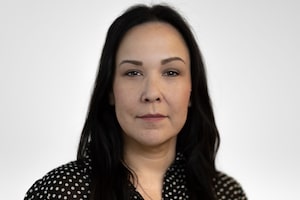Elaine Kicknosway, left, and Colleen Hele Cardinal stand inside the Pinnacle Hotel Harbourfront, in Vancouver, on April 3.Kayla Isomura/The Globe and Mail
Barbara Bad Elk’s last memory of her baby brother Jack was from 1975, when he was just a year old, crying in the back seat of a car. Child welfare agents had taken him, Ms. Bad Elk and four of her other siblings from their home in Sioux Valley Dakota Nation, in Manitoba. They were placed in foster care and eventually adopted into non-Indigenous families.
Last month in Ottawa, more than 2,000 kilometres from where they last saw each other, Ms. Bad Elk reunited with Jack for the first time in close to 50 years.
They were at a gathering of survivors of the decades-long campaign of apprehensions of Indigenous children now known as the Sixties Scoop. The event was part of a grassroots effort to help them reconnect with their Indigenous families and identities.
“He was no longer small,” Ms. Bad Elk said. Their traumatic moment of parting, she said, “is forever etched in my mind.”
At just five years old, Ms. Bad Elk was adopted by a white couple in Pennsylvania. Jack was eventually adopted by a white family in Manitoba. Both grew up disconnected from their culture, language and Dakota identity. Ms. Bad Elk now lives in Washington, D.C.
The siblings are among more than 22,000 Indigenous children in Canada who were taken from their birth parents by government child welfare agencies between the 1950s and 1980s. They were adopted into non-Indigenous families in Canada, the U.S. and other countries. Some were abused in their new homes.
About 50 survivors were at last month’s gathering, the sixth one held by the Sixties Scoop Network since survivors Colleen Hele Cardinal and Elaine Kicknosway started the advocacy group in 2014. Their efforts have created a new family and community that is helping survivors heal.
“It’s eye-opening. It’s life-changing for them to come to these gatherings and to be with other survivors,” Ms. Cardinal said.
Ms. Cardinal said those who were swept up in the scoop are often shocked to learn that there are others like themselves. An $875-million class-action settlement in 2018 awarded Sixties Scoop survivors $25,000 each.
“They actually think that their experience was unique – that they were raised with white people, and that it only happened to them,” she said. “We were raised in silos.”
The settlement brought some survivors together for the first time. It unleashed a great deal of grief, loss and anger, Ms. Cardinal said.
More than 21,000 individual settlement claims have been approved to date. Some of the settlement money went to a healing foundation that is helping the Sixties Scoop Network fund an online mapping project for survivors.
The group’s map allows users to build profiles and share information about their journeys, such as where they were born, where they ended up and whether they want to find or be contacted by their biological families. They can upload photos and videos.
So far, more than 100 survivors have mapped themselves.
Ms. Cardinal and Ms. Bad Elk have returned to visit their birth communities and reunited with their biological families. During a visit as a young adult, Ms. Bad Elk reclaimed her ancestral name. But both women say these reunions don’t always produce happy endings, because of how deep the pain runs.
”There was a lot of hurt and shame and guilt about us that were taken away,” Ms. Cardinal said, adding that it can be difficult for communities to acknowledge survivors and welcome home those who want to repatriate.
“Some of us were successfully assimilated. It takes a long time to undo that damage,” she added. She is Cree, from the Saddle Lake First Nation in Alberta, but she said she has learned from the Anishinaabe culture in Ontario.
She said Sixties Scoop survivors have, in a sense, become a community of their own. “We have a birth family, and we have an adoptive family. And sometimes we’re estranged from both of those families,” she explained.
“Having a group to identify and belong to is so important.”
Ms. Bad Elk said meeting her brother Jack and fellow survivors in Ottawa had provided some unexpected healing.
“I feel like the clouds have parted,” she said. “I feel happier.”
 Willow Fiddler
Willow Fiddler